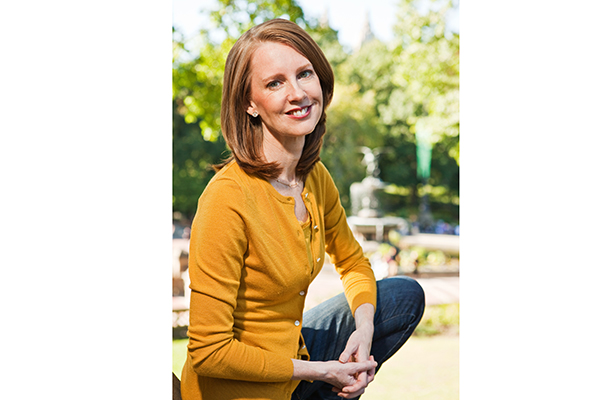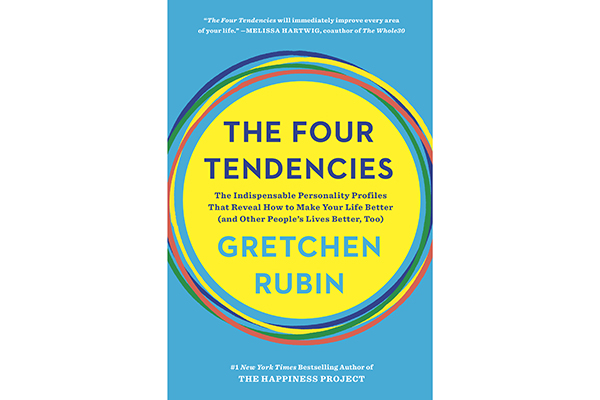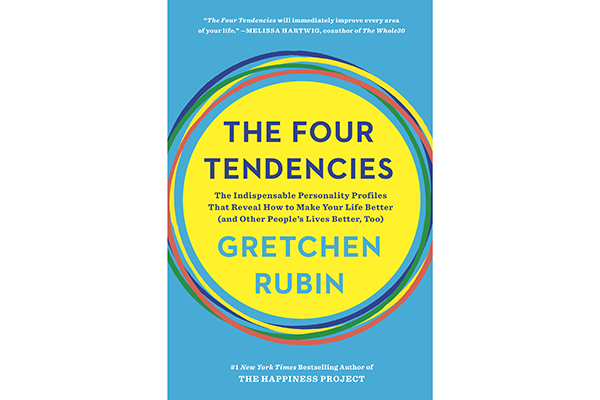Take the four tendencies quiz and learn the secret behind your motivation
We speak to Gretchen Rubin, author of The Four Tendencies, about the different ways in which people are motivated
Sometimes we’re our own worst enemies when it comes to sticking to good behaviour. We might find ourselves saying: ‘I need to walk 10,000 steps a day’, or ‘I must stop snacking on biscuits’, but when it comes to it, we just can’t change our behaviour. Or can we?
It could be that creating a new habit is a simple matter of knowing what really motivates you. That’s the premise behind Gretchen Rubin’s new book The Four Tendancies. In it, she succinctly divides everyone into one of four categories depending on how they respond to the demands of the outside world, as well as their own inner expectations.
You might have read Gretchen’s other works, which include The Happiness Project and Better Than Before (if not, we highly recommend them) but she refers to her latest theory as a ‘eureka moment’.

Portrait of Gretchen Rubin, NYC
‘My friend made a comment over lunch, and it hit me like a tonne of bricks,’ says Gretchen. ‘She said she would be happier if she exercised more, but she couldn’t motivate herself. She said it was weird, because was on the track team at school, and never had trouble sticking to it.
‘I started thinking about what made these times different, and realised she needed the accountability of being on a school team to motivate her.’
That makes her friend a classic obliger – the most common of the four tendencies.
Gretchen continued to consider the differences between people, looking at things like how they felt about New Year’s resolutions, and found there tended to be four typical responses, often using the same language.
‘The tendencies shine a spotlight on something you might not have understood about yourself,’ she says. ‘The minute it emerged it was 100% clear to me, and explained a lot of patterns. I’d often been puzzled by other people, but now I can see their tendencies I have more compassion for them.’
What are the four tendencies?
Upholder
The second rarest category, and the one that Gretchen herself belongs to. Upholders respond to both inner and outer expectations, and they love rules.
Positives about being an Upholder
Upholders get things done! If their boss asks them to do something, consider it complete. Equally they are good at sticking to their own plans, such as New Year’s resolutions, without needing to be nagged or persuaded.
‘I don’t really need outer accountability to get things done, people don’t need to give me deadlines,’ says Gretchen, ‘and that’s very freeing.’
Negatives about being an Upholder
‘Upholders sometimes struggle with ‘tightening’’, says Gretchen. ‘They get anxious if their routine is disrupted, for example if they can’t exercise every day because they are sick. They need reminding that sometimes to keep going, you need to stop for a bit.’
Obliger
The most common category, obligers respond to outer expectations rather than inner ones. That means if there’s a personal goal they want to achieve, they will need someone to check in with them for accountability, such as a personal trainer.
Positives about being an Obliger
Looking for a reliable member for your book group, or an enthusiastic gym buddy? Your obliger friend is sure to show up and bring her A-game!
Negatives about being an Obliger
Obligers need outer accountability to get things done, and can spend too much time people pleasing.
Questioner
The second most common category, questioners need to know the reasons behind things before getting anything done. Resists outer expectations, meets inner ones.
Positives about being a Questioner
Once questioners find their motivation, they don’t have a problem with getting things done. ‘Questioners need to have absolute clarity about why,’ says Gretchen. ‘If you’ve decided to eat healthily you need to dig down – what does it mean to eat healthily? Why will it help you? Once you have clarity, the actions will follow.’
Negatives about being a Questioner
‘They can stall out by doing too much research, and get analysis paralysis,’ says Gretchen. ‘Sometimes trying one way of doing things is better than none.’
Rebel
The rarest category, rebels resist pretty much everything! ‘They often struggle when they try to do the things that work for other people, like to do lists or signing up for classes,’ says Gretchen. ‘Actually what suits them is to feel like everything is a choice, and that they have absolute freedom. Rebels can try making a ‘could do’ list instead.’
Positives about being an Rebel
Rebels can be great at thinking outside of the box, and coming up with new ways of getting things done. Plus when they find a cause they care about, they can be very dedicated.
Negatives about being an Rebel
As you can imagine, they can often cut their noses off to spite their faces rather than doing what’s expected – even when it would be good for them.
What makes us a certain tendency?
‘I think your tendency is genetic,’ says Gretchen. ‘I think obviously you will be shaped by your background – obviously if you live somewhere like Korea and you’re a questioner, you might learn not to voice those questions – but ultimately it’s genetic.’
- Want to find out which one you are? Take the Four Tendences quiz here!
Want to dig deeper into your tendency and meet other people with similar motivations and issues? Gretchen is launching a Four Tendencies course, which will involve video lessons. Enrolment for the course is now closed, but will reopen for October. Sign up to hear more on the Four Tendencies course.
- Find out your play personality with our quiz!









